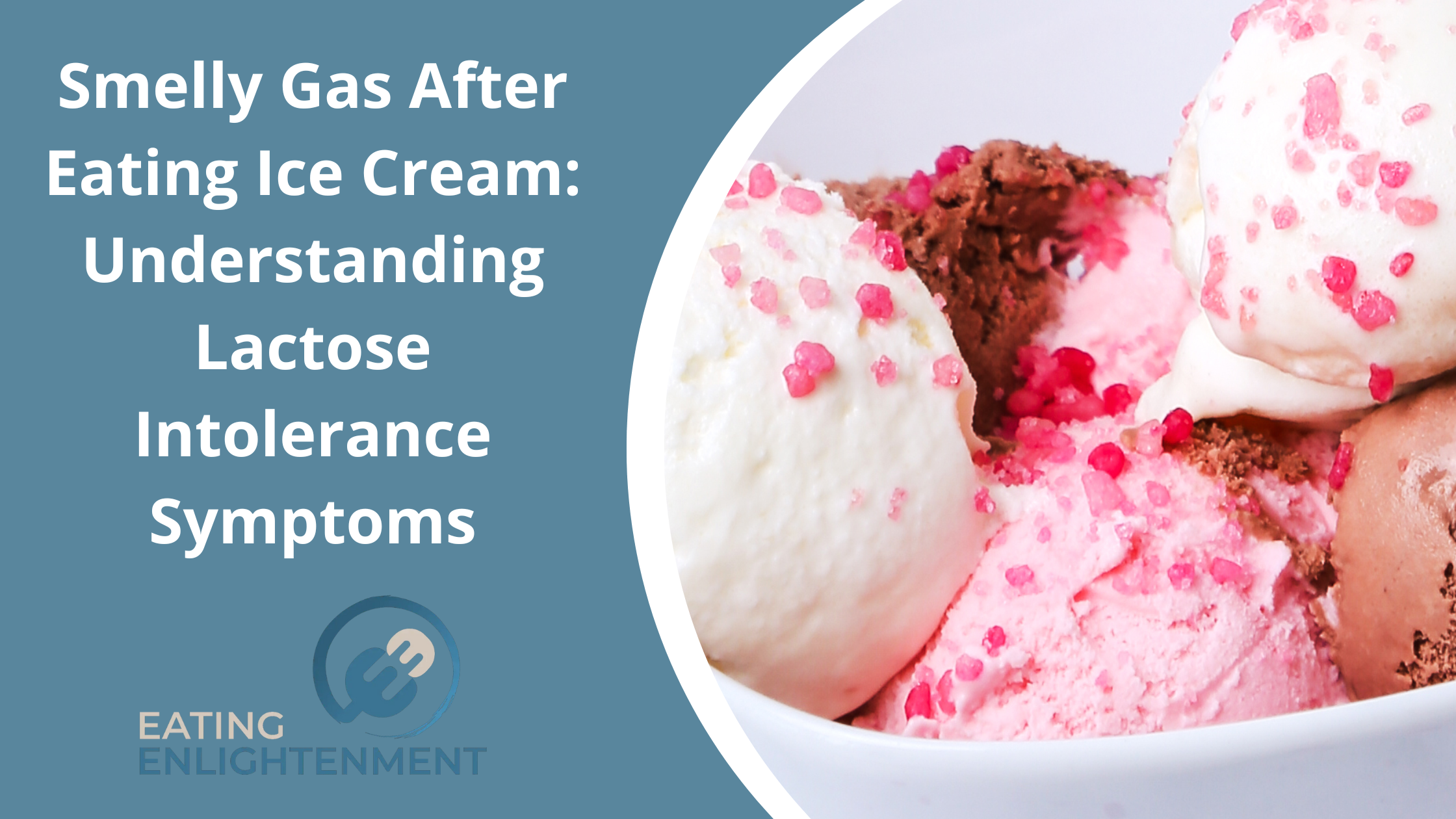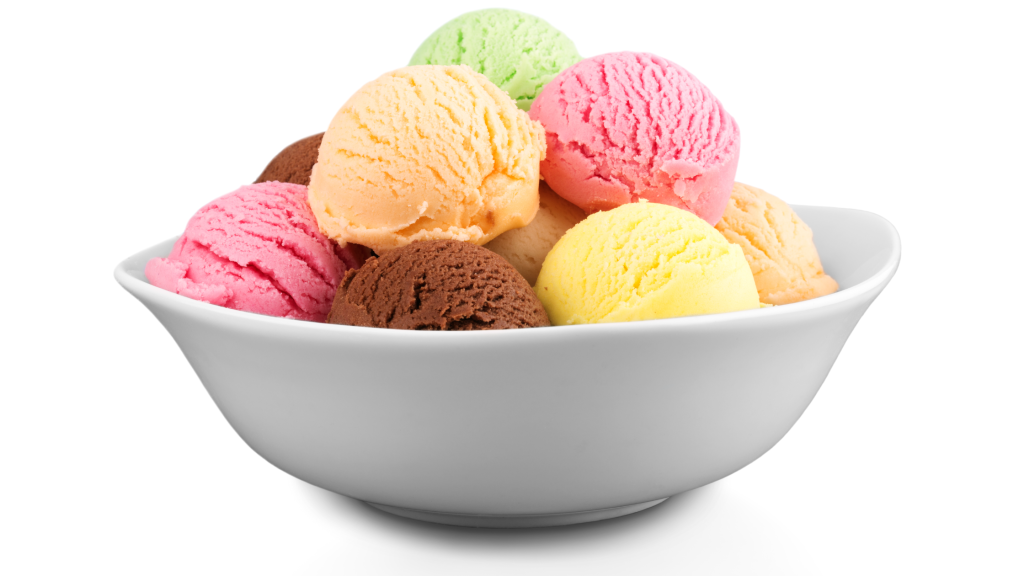Ice cream is one of the most popular desserts worldwide, but for some people who absorb lactose well, it can result in unpleasant symptoms such as smelly gas, bloating, and abdominal pain. If you have experienced these symptoms, it might be a sign of lactose intolerance.
This condition affects millions of people worldwide and can lead other symptoms due to discomfort, embarrassment, and a reduced quality of life. But don’t worry; there are ways to manage lactose intolerance symptoms and enjoy ice cream without adverse effects.
That’s what we cover in this blog article!
What is Lactose?
Lactose is a sugar found in milk and milk products, including ice cream. When we consume lactose, our small intestine breaks it down into glucose and galactose using an enzyme called lactase.
However, some people have low levels of lactase or no lactase at all, resulting in undigested lactose reaching the large intestine, where gut bacteria ferment it, producing gas, and other substances. This leads to the characteristic symptoms of lactose intolerance, such as smelly gas, bloating, abdominal and stomach pain,, and diarrhea.
Fortunately, there are ways to manage lactose intolerance symptoms when eating ice cream. The first step is to limit the amount of lactose you consume per serving. Most people with lactose intolerance can tolerate small to moderate amounts of lactose, depending on their tolerance level.
You could try eating a small scoop of ice cream at a time or choosing low-lactose or lactose-free ice cream options available in grocery stores.
Manage Lactose Intolerance Symptoms
Another way to manage lactose intolerance symptoms is to take lactase supplements, such as pills or drops, before consuming ice cream or other lactose-containing foods. Lactase supplements contain the lactase enzyme that our body lacks, breaking down lactose into simpler sugars that we can digest. This way, you can enjoy ice cream without experiencing uncomfortable digestive symptoms afterwards.
In addition to these strategies, you could also try combining ice cream with other foods to slow down the digestion and absorption of lactose in your gut.
For example, to develop lactose intolerance, you could eat ice cream with nuts, dark chocolate, or fruits rich in fiber, such as strawberries or blueberries. These foods contain fat, protein, or fiber that can slow down the transit of lactose in your intestines, reducing the onset and severity of lactose intolerance symptoms.
Finally, keeping a food diary and tracking your symptoms could help you identify your triggers and adjust your diet accordingly.
Why do I have foul-smelling gas after eating dairy?

Foul-smelling gas after eating or drinking milk or dairy is often a sign of lactose intolerance.
This means your body has trouble digesting lactose, which is the sugar in milk and other dairy products. When lactose isn’t properly digested, it can lead to gas and other uncomfortable symptoms.
Here’s how it works:
Normally, an enzyme called lactase breaks down lactose into simpler sugars that your body can easily absorb. But if you’re lactose intolerant, you don’t have enough lactase. So, the lactose stays in your digestive tract and system and gets broken down by bacteria instead. This process produces gas, which can smell bad.
If you notice this problem often after eating dairy, you might want to talk to a doctor. They can help figure out if you’re lactose intolerant or if something else is causing your symptoms.
Does ice cream give you bad gas?
Ice cream is a dairy product, and it contains lactose, a type of sugar that some people’s bodies have trouble digesting. When we can’t fully break down lactose, it can result in gas, bloating, and even discomfort. This condition is known as lactose intolerance.
Now, think about your experience symptoms and how you feel after enjoying a scoop or two of ice cream. Do you often experience these symptoms? If yes, there’s a chance you could be lactose intolerant.
Is lactose intolerance gas smelly?
When people with lactose intolerance eat dairy products, they can experience several symptoms. One of these symptoms could be passing gas that has an unpleasant smell.
Why does this happen? Well, when our bodies can’t fully digest lactose, it travels to our colon without being properly broken down. Here, the lactose interacts with our gut bacteria, leading to gas production. And yes, this gas can sometimes be quite smelly!
Why does ice cream make me gassy but not yogurt?
Ice cream and yogurt both contain lactose, a type of sugar found in milk. Some people have trouble digesting this sugar, leading to symptoms like gas, bloating, or discomfort – a condition known as lactose intolerance.
But here’s the interesting part: even though both ice cream and yogurt contain lactose, they don’t always affect us in the same way soy milk does. Why? The answer lies in the friendly bacteria found in yogurt.
Yogurt is fermented with beneficial bacteria, often referred to as probiotics. These helpful little guys break down some of the lactose during the fermentation process, making it easier for your body to digest. That’s why many people who are lactose intolerant can still enjoy yogurt without any problems.
How do you stop gas after eating ice cream?
But here’s the good news: you don’t have to give up ice cream entirely! Here are a few helpful tips:
- Try Lactose-Free Ice Cream: Today, many brands offer lactose-free versions of your favorite flavors. Isn’t it wonderful to know you can still enjoy your sweet treats without discomfort?
- Take Lactase Supplements: Lactase is an enzyme that helps your body break down lactose. Taking these supplements before eating ice cream can aid digestion and reduce gas.
- Eat Smaller Portions: Sometimes, less is more. Try enjoying smaller servings of ice cream to lessen the impact on your stomach.
- Pair It With Other Foods: Eating ice cream as part of a meal or with other foods can help slow down the digestion of lactose, reducing symptoms.
Which foods cause the most gas?
Here are some of the top culprits:
- Beans and Lentils: These are packed with fiber and protein, but they also contain sugars that our bodies find hard to break down, causing gas.
- Broccoli, Cabbage, and Asparagus: These veggies are great for your health, but they contain a complex sugar that can produce gas when it’s broken down in your digestive system.
- Whole Grains: Foods like whole wheat and bran are high in fiber, which can lead to increased gas.
- Carbonated Drinks: The bubbles in fizzy drinks like soda can get trapped in your stomach and cause you to feel gassy.
- Dairy Products: If you’re lactose intolerant, products like milk, cheese, and ice cream can cause you to have gas.
Why does ice cream give me gas but milk doesn t?
Both ice cream and milk contain lactose—a sugar found in milk. Some people have trouble digesting this sugar, leading to symptoms like gas, bloating, and discomfort. This is known as lactose intolerance.
But here’s where things get interesting. Even though both ice cream and milk contain lactose, they don’t always affect us in the same way. Why? The answer lies in the amount of lactose present and how quickly it is consumed.
Ice cream usually contains more the sugar called lactose, than milk. Plus, we tend to consume ice cream faster than milk, which can overwhelm your digestive system, especially if you’re sensitive to lactose. On the other hand, you might sip on a glass of milk slowly, giving your body more time to handle the lactose.
Smelly Gas After Eating Ice Cream Conclusion
As you can see, smelly gas after eating ice cream is not a reason to give up on this delicious treat.
With some planning and adjustments, you can manage lactose intolerance symptoms and satisfy your sweet tooth. Remember to listen to your body, experiment with different strategies, and don’t hesitate to seek advice from your healthcare provider when needed.
Enjoy your ice cream!







